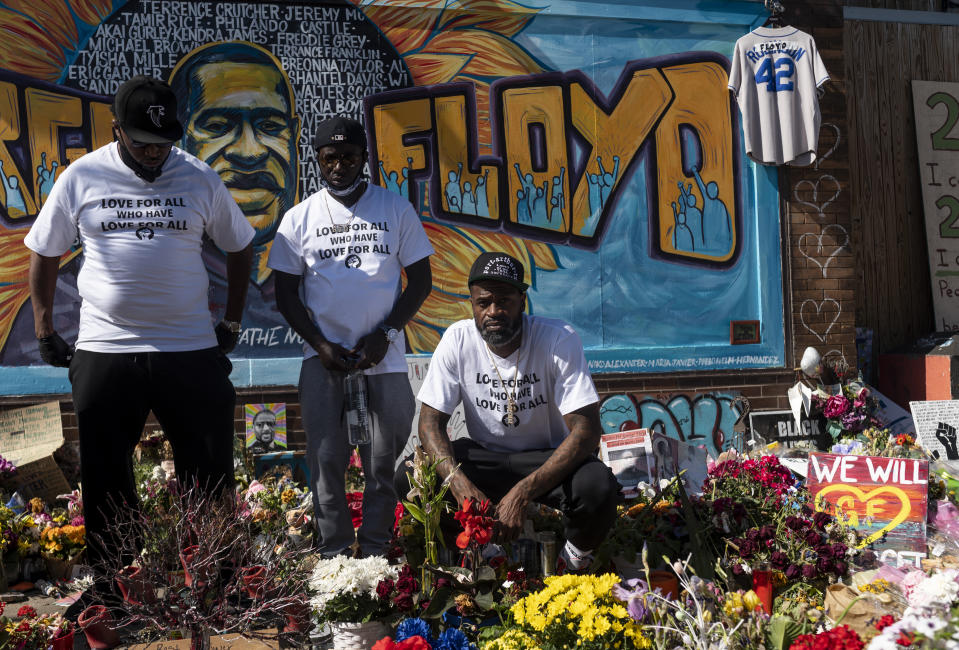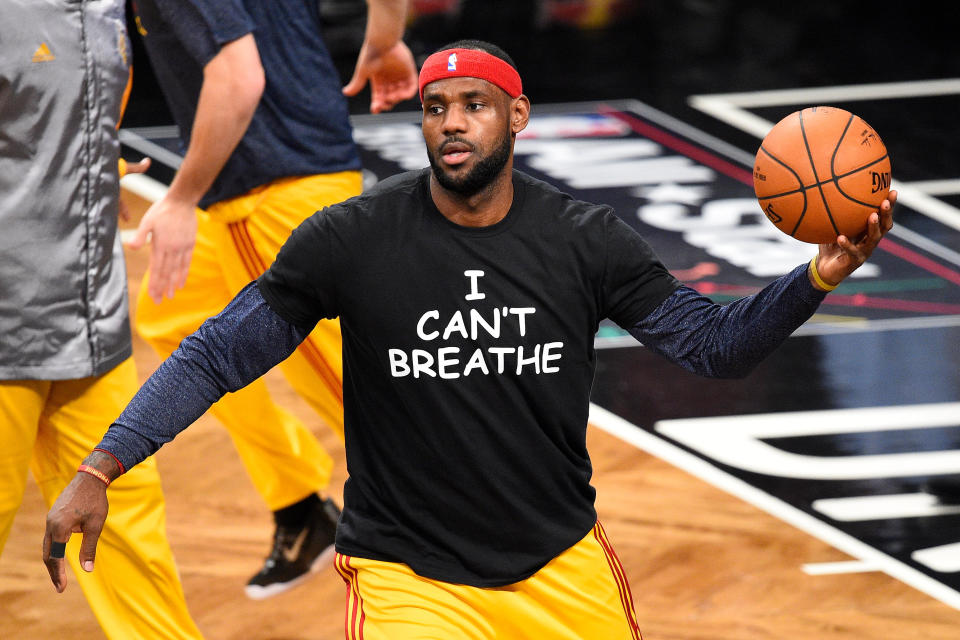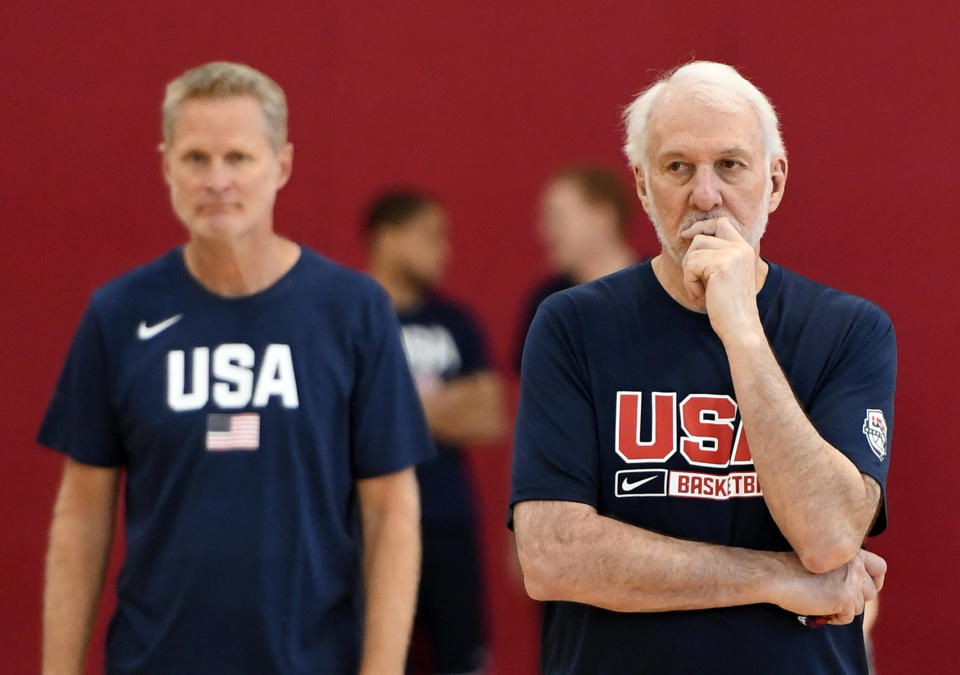The NBA's return brings with it a leadership opportunity in the social justice movement
Basketball has never felt less essential. Worldwide protests against racial injustice and police brutality have pushed a global pandemic below the fold, and yet the NBA is moving toward resuming its 2019-20 season.
There was a time we hoped the league could provide a welcome distraction for Americans quarantined and isolated because of the coronavirus. That time has passed. We should no longer welcome any distraction from the movement currently spreading across the country. All eyes should be focused on a broken system.
“Everything going on right now, basketball is not important,” Los Angeles Clippers guard Patrick Beverley tweeted on Wednesday, surely echoing the thoughts of many of his colleagues who have joined protests and spoken out in the wake of George Floyd’s homicide in custody of the Minneapolis Police Department.
I had my reservations about the NBA returning in the midst of a pandemic, so sports seem even sillier now, but basketball is coming back, and I am trying to reconcile with that, because I write about basketball. Here is where I have landed: The league has a chance to dominate this conversation in the next five months, and seizing that opportunity could carry the current movement forward in a way that creates a lasting impact.

When the NBA returns at the Walt Disney World Resort next month, players and coaches will have a massive audience as the faces of the most popular North American sport resuming games this summer. Among the four major North American sports leagues, the NBA has the highest percentage of African-Americans at every level of its organizations — from players to coaching staffs to executives to the league office — by a wide margin.
Three quarters of NBA players are black, according to the Institute for Diversity and Ethics in Sport, and many have been among the most vocal social justice advocates. Malcolm Brogdon of the Indiana Pacers joined a peaceful protest in Atlanta partially organized by Jaylen Brown of the Boston Celtics on Saturday, and the two rising stars made public pleas to a crowd of thousands in their hometown, a few hundred miles from where a black man, Ahmaud Arbery, was gunned down while jogging last month.
“This is a moment,” Brogdon told protesters. “We have leverage right now. We have a moment in time. People are going to look back, our kids are going to look back at this and say, ‘You were part of that.’ I’ve got a grandfather that marched next to Dr. King in the sixties, and he was amazing. He would be proud to see us all here. We got to keep pushing forward. Jaylen has led this charge, man, and I’m proud of him. We need more leaders.”
Former NBA player turned popular broadcaster Stephen Jackson was a close friend of Floyd’s. He was seen in recent days holding Floyd’s young daughter on his shoulders as she told onlookers, “Daddy changed the world.” Flanked by All-Star center Karl-Anthony Towns and other Minnesota Timberwolves, Jackson spoke passionately from a justice rally in Minneapolis’ Government Center Plaza last week.
Stephen Jackson with just about the most powerful words I’ve ever heard pic.twitter.com/7guc6O4T6W
— Jon Krawczynski (@JonKrawczynski) May 29, 2020
“When was murder ever worth it?” he said, referencing Derek Chauvin, the Minneapolis police officer since charged with Floyd’s murder. “But if it’s a black man, it’s approved. You can’t tell me when that man had his knee on my brother’s neck, taking his life away with his hand in his pocket, that that smirk on his face didn’t say, ‘I’m protecting.’”
NBA players have been increasingly vocal about racial injustice in the years since LeBron James tweeted a photo of his Miami Heat donning hooded sweatshirts in honor of Trayvon Martin, a 17-year-old high school student who was shot and killed by Orlando-area neighborhood watch captain George Zimmerman in 2012. James was also among dozens of players to sport “I Can’t Breathe” T-shirts in protest of a grand jury opting not to indict New York City police officer Daniel Pantaleo for the choking death of Eric Garner in 2014.

James has criticized Donald Trump for furthering the racial divide on a number of occasions, notably after the president referred to Colin Kaepernick and other NFL players protesting police brutality as “sons of bitches” and also after he defended “very fine people on both sides” of a 2017 white supremacist rally in Charlottesville, Virginia, where a neo-Nazi drove into a crowd of anti-racism protesters, killing Heather Heyer.
Over the past week, James has pledged support for protests to tens of millions of social media followers.
If you still haven’t figured out why the protesting is going on. Why we’re acting as we are is because we are simply F-N tired of this treatment right here! Can we break it down for you any simpler than this right here???? 🤦🏾♂️. And to my people don’t worry I won’t stop until I see https://t.co/e4pJ0PvwJj
— LeBron James (@KingJames) June 4, 2020
“I won’t stop until I see change,” James wrote on Thursday.
The audience for James and other NBA players will only increase when they convene to resume the 2019-20 season in Orlando next month, when the league will take center stage on national television. The most predominantly black sports league in America, a league that empowers its players to voice their opinions, will have one of the most powerful voices in the world in the months leading up to the presidential election.
Racism and social justice are not inherently political issues, but they become more so when the president of the United States responds to protests not with a consistent unifying message but by calling Minneapolis protesters “thugs” in a Twitter rant that also suggested, “when the looting starts, the shooting starts,” when he called on the nation’s governors to “dominate” protesters or risk looking “like a bunch of jerks,” and when he promoted the use of tear gas on peaceful protesters to clear his path for a photo opportunity.
In one breath Trump once suggested Kaepernick and other NFL players peacefully protesting racial injustice during the national anthem should be deported, and in another he said this week, “I am ... an ally of all peaceful protesters.” It is clear why Stephen Curry, Steve Kerr and members of the Golden State Warriors repeatedly clashed with Trump over his divisive remarks and why Trump rescinded an offer to visit the White House that was never extended to the champions of the blackest sports league in America.
The NBA also features a number of white men who have pledged their support for social justice and anti-racism efforts and put their face to white privilege. Kyle Korver, a senior member of the Eastern Conference-leading Milwaukee Bucks, penned an essay on the subject for The Players’ Tribune. Kerr and former Detroit Pistons coach Stan Van Gundy joined the Players Coalition in endorsing a letter to Attorney General William Barr last month that called for the arrest of the men who killed Arbery.

“I've never met a single black parent that doesn't have to sit their kids down and talk to them very directly about how you deal with the police if you're stopped,” Van Gundy told Yahoo Sports in late May. “‘You do this, this and this, so you come home alive.’ I started getting more of that in my career. I'm like holy [expletive]. I've never once talked to my kids about that or felt the need to. If my kid got pulled over, it was because they deserved to get pulled over. Even if they mouthed off, nobody was gonna shoot them.”
Kerr hosted San Antonio Spurs coach Gregg Popovich this week on his “Flying Coach” podcast with Seattle Seahawks coach Pete Carroll for a conversation about how they, as privileged white men, can engage players of all backgrounds in meaningful conversations and assist the effort to bring about systemic change. Popovich has long been one of the NBA’s most vocal critics of Trump’s leadership.
“The thing that strikes me is that we all see this police violence and racism and we’ve seen it all before but nothing changes,” Popovich told The Nation’s Dave Zirin in a conversation prompted by the oft-private coach. “That’s why these protests have been so explosive. But without leadership and an understanding of what the problem is, there will never be change. And white Americans have avoided reckoning with this problem forever because it’s been our privilege to be able to avoid it. That also has to change.”
Popovich went so far as to call the president “a deranged idiot.” Kerr has called Trump “a blowhard.” Curry called him an asset, “if you remove the et.” James called him a “bum.” The NBA’s voice on this is glaring.
Players and coaches have two months before the season resumes to craft a more effective message to the American public, one that elevates the national conversation from name-calling and attempts by detractors to conflate peaceful protests with looting and the excessive use of force by police with assaults against police officers. There is an opportunity to further a sports activism cause once carried by their predecessors at the 1967 Cleveland Summit, including Bill Russell, who also had a front-row seat as a guest of Dr. Martin Luther King Jr. at the March on Washington and for whom the NBA’s Finals MVP trophy is named.
The National Basketball Coaches Association recently condemned “police brutality, racial profiling and the weaponization of racism” as “shameful, inhumane and intolerable,” forming a committee to combat social injustices with tangible reform in NBA cities. That is a start. There is a long way to go, but coaches and players can undoubtedly serve as leaders in carrying the momentum of this movement into the most consequential election of many of their lifetimes.
The best reason to welcome the NBA’s return in the face of a pandemic is what might unfold off the court in Orlando during the months before another champion refuses to accept a White House invitation. In that way, basketball might just be essential again.
– – – – – – –
Ben Rohrbach is a staff writer for Yahoo Sports. Have a tip? Email him at rohrbach_ben@yahoo.com or follow him on Twitter! Follow @brohrbach
More from Yahoo Sports:

 Yahoo Sports
Yahoo Sports 
